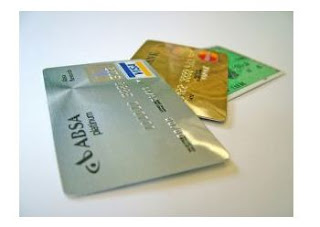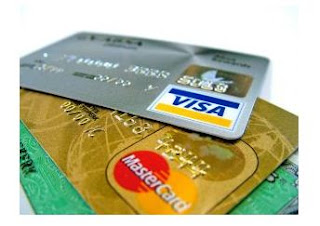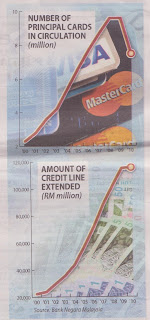 |
| Credit Cards |
The right credit card can help you manage your finances.
When you're choosing a new card, it's a good time to be picky.
Shopping for a new credit card can be pretty overwhelming, especially considering you have hundreds of types of cards to choose from. Should you go for a rewards card, the lowest interest rate card you can find, or the card that comes with a free T-shirt? If you're trying to sort through all your options, consider these five tips that I recently shared on "The Tavis Smiley Show" from Public Radio International.
1. Use comparison websites. The myriad of credit card options today is matched by a slew of comparison websites that make it easier than ever to customize your search for the right card for you. Google's credit card search tool lets users narrow down their search by interest rate, rewards, and a dozen other factors. IndexCreditCards.com, Bankrate.com, CreditCards.com, CreditKarma.com, and NerdWallet.com all offer credit card search tools.
If you always pay your bill in full each month and never carry any debt, then you can take a closer look at the rewards options. Perhaps you prefer cash back to airline miles or points that let you make purchases at retailers such as Best Buy (BBY) or Home Depot (HD). If you do carry any debt, though, then you'll want to focus on minimizing the APR, or annual percentage rate. Just don't sign up for the first offer you get in the mail because it might not be the best one for your situation.
2. Check up on the extra protections that come with your card. Credit cards come with various forms of protection, including theft, non-delivery of items from a company, and even extended warranties. If you travel a lot, then you might want to focus on cards that come with travel perks like insurance; if you buy a lot of large electronics, then the extended warranty protection might be for you. If you're a big shopper, the price protection, which offers to make up the difference if an item you buy drops in price, could be your best bet. The important thing is to read the fine print, ask questions so you know what perks come with your card, and pick the card that has the benefits that are important to you.
3. Don't be tempted by freebies. Credit cards sometimes offer tempting short-term benefits, including token gifts like T-shirts or a temporary zero percent APR. For the most part, you don't want to get sidetracked by these offers because they mask the far more important factors, namely the interest rate and any relevant fees. In fact, you should probably ignore introductory gifts altogether because you'll have your card for longer than you'll enjoy the added freebies. You can buy your own T-shirt later.
4. Avoid rewards cards unless you carry zero debt. On average, rewards cards carry higher interest rates than non-rewards cards. According to IndexCreditCards.com, the average interest rate on a consumer rewards card is currently 17.64 percent, and the average rate on a non-rewards card is 15.48 percent -- that's a full two percentage point difference. It might not sound like much, but if you're carrying debt each month, then you want to make sure you're paying as little as possible for it. (Along with developing a plan to pay it off in full as soon as possible.) Any rewards are not worth the extra interest payments.
5. Rates and fees can be negotiable, so always ask. Credit card providers are sometimes more flexible than you might think. If you're a good customer with a strong credit history, then you might have some leeway to ask for a lower interest rate or for an unexpected fee to be removed. You can sometimes negotiate better terms for yourself, especially if you're a good customer who pays on time. There's no harm in calling up the customer service representative to ask what they can do for you.
The bottom line: You want to make sure your credit card is working for you, and not vice versa. Pay off your bill each month so you're not carrying any debt, and take advantage of the free rewards coming your way. If you do have debt, make a plan to pay it off, because the high-interest rates on credit cards add up quickly over time.
1. Use comparison websites. The myriad of credit card options today is matched by a slew of comparison websites that make it easier than ever to customize your search for the right card for you. Google's credit card search tool lets users narrow down their search by interest rate, rewards, and a dozen other factors. IndexCreditCards.com, Bankrate.com, CreditCards.com, CreditKarma.com, and NerdWallet.com all offer credit card search tools.
If you always pay your bill in full each month and never carry any debt, then you can take a closer look at the rewards options. Perhaps you prefer cash back to airline miles or points that let you make purchases at retailers such as Best Buy (BBY) or Home Depot (HD). If you do carry any debt, though, then you'll want to focus on minimizing the APR, or annual percentage rate. Just don't sign up for the first offer you get in the mail because it might not be the best one for your situation.
2. Check up on the extra protections that come with your card. Credit cards come with various forms of protection, including theft, non-delivery of items from a company, and even extended warranties. If you travel a lot, then you might want to focus on cards that come with travel perks like insurance; if you buy a lot of large electronics, then the extended warranty protection might be for you. If you're a big shopper, the price protection, which offers to make up the difference if an item you buy drops in price, could be your best bet. The important thing is to read the fine print, ask questions so you know what perks come with your card, and pick the card that has the benefits that are important to you.
3. Don't be tempted by freebies. Credit cards sometimes offer tempting short-term benefits, including token gifts like T-shirts or a temporary zero percent APR. For the most part, you don't want to get sidetracked by these offers because they mask the far more important factors, namely the interest rate and any relevant fees. In fact, you should probably ignore introductory gifts altogether because you'll have your card for longer than you'll enjoy the added freebies. You can buy your own T-shirt later.
4. Avoid rewards cards unless you carry zero debt. On average, rewards cards carry higher interest rates than non-rewards cards. According to IndexCreditCards.com, the average interest rate on a consumer rewards card is currently 17.64 percent, and the average rate on a non-rewards card is 15.48 percent -- that's a full two percentage point difference. It might not sound like much, but if you're carrying debt each month, then you want to make sure you're paying as little as possible for it. (Along with developing a plan to pay it off in full as soon as possible.) Any rewards are not worth the extra interest payments.
5. Rates and fees can be negotiable, so always ask. Credit card providers are sometimes more flexible than you might think. If you're a good customer with a strong credit history, then you might have some leeway to ask for a lower interest rate or for an unexpected fee to be removed. You can sometimes negotiate better terms for yourself, especially if you're a good customer who pays on time. There's no harm in calling up the customer service representative to ask what they can do for you.
The bottom line: You want to make sure your credit card is working for you, and not vice versa. Pay off your bill each month so you're not carrying any debt, and take advantage of the free rewards coming your way. If you do have debt, make a plan to pay it off, because the high-interest rates on credit cards add up quickly over time.










